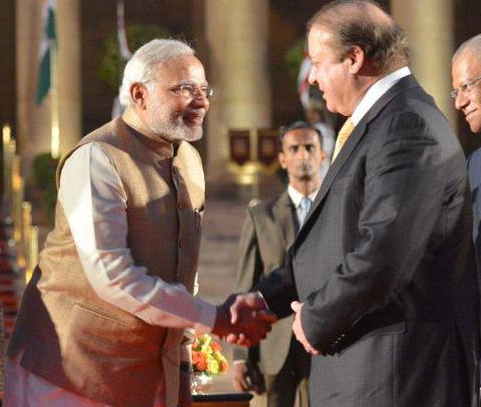New Delhi, Jul 18: As tensions escalated with fresh ceasefire violations by Pakistan, Congress today said India's Pakistan policy under Narendra Modi dispensation has become an "international joke".

"The Prime Minister must spell out clearly what India has achieved by this so-called joint statement with Pakistan at Ufa... Pakistan has continued to backstab us in the last 15 months," party spokesman R P N Singh told reporters.
Attacking Modi for his "prompt" acceptance of Pakistan Prime Minister Nawaz Sharif's invite to visit the neighbouring country, Singh said he must explain to the nation what was the "tearing hurry" in taking the decision as Pakistan has not taken any action against the perpetrators of Mumbai attack.
"There have been more than 800 ceasefire violations. At least a dozen soldiers have lost their lives and 18 civilians have been killed since the time BJP came to power, but Modi has ignored all these sacrifices in order to register his so-called victory in the context of Pakistan policy," he said.
He recalled that Manmohan Singh had not visited Pakistan even once in his ten-year long tenure as Prime Minister.
"The BJP with all its rhetoric on nationalism is failing to handle Jammu and Kasmir day by day and has adopted a completely directionless and embarrassing policy towards dealing with Pakistan," he remarked.
Condemning attempts to disturb peace in Jammu and Kashmir, he said Pakistani and ISIS flags were raised by protesters in Srinagar and Anantnag today.
"The same incident happened in Srinagar yesterday, when the Prime Minister was in Jammu," he said.
Demanding strong action against such miscreants, the Congress leader said, "Any attempt to legitimise their cause by the state will expose the soft approach by the Modi government towards such militants, who cannot be called Kashmiris."
Meanwhile, another party leader Manish Tewari suspected a "larger design and ulterior motive" by the BJP-PDP government in Jammu and Kashmir to "handover" parts of Kashmir to Pakistan by not acting against waving of flags of Pakistan, Lashker-e-Toiba (LeT) and ISIS.
"Because if any government worth its salt wants to take action and crackdown on separatists, it obviously can take action.
"But the fact that it has been happening repeatedly since the BJP-PDP government has taken office points to a larger design and ulterior motive, may be, to possibly handover parts of what is Indian Kashmir to Pakistan. Otherwise there is no legitimate reason why the government in Srinagar is not acting against these people," he said.
Tewari noted that waving Pakistani flags was one thing but waving the ISIS flags was something completely different.
Yesterday, clashes broke out between a group of youths and security forces in Srinagar during which some separatist elements had waved flags of Pakistan, LeT and ISIS.
As soon as Friday prayers got over at Jami Masjid in Nowhatta area of the city, a group of youths had waved the controversial flags and raised pro-separatist and pro- Pakistani slogans.
Tewari also raised questions over Modi government's handling of relations with Pakistan after its repeated ceasefire violations along the Line of Control (LoC) in J&K by targeting several Indian positions with small arm fire.
He asked why Prime Minister Narendra Modi went and accepted that joint statement with Nawaz Sharif in Ufa.
"Because after Ufa what you've seen is Pakistani prosecutor rubbishing the entire joint statement with regard to Lakhvi's voice samples, then you have Sartaj Aziz (Pakistan Prime Minister's Adviser on National Security and Foreign Affairs) standing up and virtually torpedoing the joint statement.
"Then you have the increased shelling from Pakistan on the international border on the LOC along with the story that they have shot down an Indian drone and on top of that comes the whole visa question. So, therefore if this is what was to happen, then why this photo opportunity in Ufa, I think thats the larger question which the Indian government has to answer to itself," he said.
Leader of Opposition Ghulam Nabi Azad also attacked Pakistan for ceasefire violation and asked it to learn a lesson from Ramzan month.
"Pakistan should learn this lesson that the Ramzan month is a month of patience, you should spread love and harmony to your people and in the world too and you should celebrate happiness with your neighbour too instead of bombarding them," he said.





Comments
Add new comment